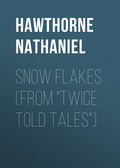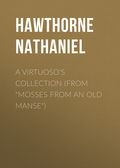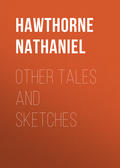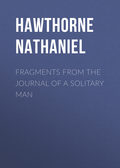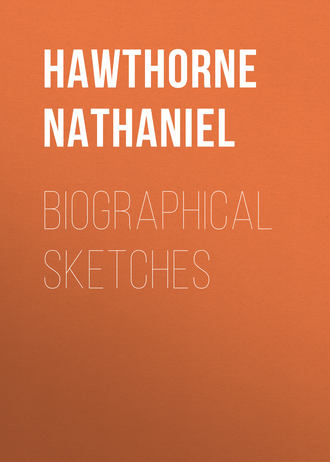
Натаниель Готорн
Biographical Sketches
THOMAS GREEN FESSENDEN
Thomas Green Fessenden was the eldest of nine children of the Rev. Thomas Fessenden. He was born on the 22d of April, 1771, at Walpole, in New Hampshire, where his father, a man of learning and talent, was long settled in the ministry. On the maternal side, likewise, he was of clerical extraction; his mother, whose piety and amiable qualities are remembered by her descendants, being the daughter of the Rev. Samuel Kendal of New Salem. The early education of Thomas Green was chiefly at the common school of his native place, under the tuition of students from the college at Hanover; and such was his progress, that he became himself the instructor of a school in New Salem at the age of sixteen. He spent most of his youthful days, however, in bodily labor upon the farm, thus contributing to the support of a numerous family; and the practical knowledge of agriculture which he then obtained was long afterwards applied to the service of the public. Opportunities for cultivating his mind were afforded him, not only in his father's library, but by the more miscellaneous contents of a large bookstore. He had passed the age of twenty-one when his inclination for mental pursuits determined him to become a student at Dartmouth College. His father being able to give but little assistance, his chief resources at, college consisted in his wages as teacher of a village school during the vacations. At times, also, he gave instruction to an evening class in psalmody.
From his childhood upward, Mr. Fessenden had shown symptoms of that humorous turn which afterwards so strongly marked his writings; but his first effort in verse, as he himself told me, was made during his residence at college. The themes, or exercises, of his fellow students in English composition, whether prose or rhyme, were well characterized by the lack of native thought and feeling, the cold pedantry, the mimicry of classic models, common to all such productions. Mr. Fessenden had the good taste to disapprove of these vapid and spiritless performances, and resolved to strike out a new course for himself. On one occasion, when his classmates had gone through with their customary round of verbiage and threadbare sentiment, he electrified them and their instructor, President Wheelock, by reading "Jonathan's Courtship." There has never, to this day, been produced by any of our countrymen a more original and truly Yankee effusion. He had caught the rare art of sketching familiar manners, and of throwing into verse the very spirit of society as it existed around him; and he had imbued each line with a peculiar yet perfectly natural and homely humor. This excellent ballad compels me to regret, that, instead of becoming a satirist in politics and science, and wasting his strength on temporary and evanescent topics, he had not continued to be a rural poet. A volume of such sketches as "Jonathan's Courtship," describing various aspects of life among the yeomanry of New England, could not have failed to gain a permanent place in American literature. The effort in question met with unexampled success: it ran through the newspapers of the day, reappeared on the other side of the Atlantic, and was warmly applauded by the English critics; nor has it yet lost its popularity. New editions may be found every year at the ballad-stalls; and I saw last summer, on the veteran author's table, a broadside copy of his maiden poem, which he had himself bought in the street.
Mr. Fessenden passed through college with a fair reputation for scholarship, and took his degree in 1796. It had been his father's wish that he should imitate the example of sonic of his ancestors on both sides, by devoting himself to the ministry. He, however, preferred the law, and commenced the study of that profession at Rutland, in Vermont, with Nathaniel Chipman, then the most eminent practitioner in the State. After his admission to the bar, Mr. Chipman received him into partnership. But Mr. Fessenden was ill qualified to succeed in the profession of law, by his simplicity of character, and his utter inability to acquire an ordinary share of shrewdness and worldly wisdom. Moreover, the success of "Jonathan's Courtship," and other poetical effusions, had turned his thoughts from law to literature, and had procured him the acquaintance of several literary luminaries of those days; none of whose names, probably, have survived to our own generation, save that of Joseph Dennie, once esteemed the finest writer in America. His intercourse with these people tempted Mr. Fessenden to spend much time in writing for newspapers and periodicals. A taste for scientific pursuits still further diverted him from his legal studies, and soon engaged him in an affair which influenced the complexion of all his after-life.
A Mr. Langdon had brought forward a newly invented hydraulic machine, which was supposed to possess the power of raising water to a greater height than had hitherto been considered possible. A company of mechanics and others became interested in this machine, and appointed Mr. Fessenden their agent for the purpose of obtaining a patent in London. He was, likewise, a member of the company. Mr. Fessenden was urged to hasten his departure, in consequence of a report that certain persons had acquired the secret of the invention, and were determined to anticipate the proprietors in securing a patent. Scarcely time was allowed for testing the efficacy of the machine by a few hasty experiments, which, however, appeared satisfactory. Taking passage immediately, Mr. Fessenden arrived in London on the 4th of July, 1801, and waited on Mr. King, then our minister, by whom he was introduced to Mr. Nicholson, a gentleman of eminent scientific reputation. After thoroughly examining the invention, Mr. Nicholson gave an opinion unfavorable to its merits; and the question was soon settled by a letter from one of the Vermont proprietors to Mr. Fessenden, informing him that the apparent advantages of the machine had been found altogether deceptive. In short, Mr. Fessenden had been lured from his profession and country by as empty a bubble as that of the perpetual motion. Yet it is creditable both to his ability and energy, that, laying hold of what was really valuable in Langdon's contrivance; he constructed the model of a machine for raising water from coal-mines, and other great depths, by means of what he termed the "renovated pressure of the atmosphere." On communicating this invention to Mr. Nicholson and other eminent mechanicians, they acknowledged its originality and ingenuity, and thought that, in some situations, it might be useful. But the expenses of a patent in England, the difficulty of obtaining patronage for such a project, and the uncertainty of the result, were obstacles too weighty to be overcome. Mr. Fessenden threw aside the scheme, and, after a two months' residence in London, was preparing to return home, when a new and characteristic adventure arrested him.
He received a visit, at his lodging in the Strand, from a person whom he had never before seen, but who introduced himself to his good-will as being likewise an American. His business was of a nature well calculated to excite Mr. Fessenden's interest. He produced the model of an ingenious contrivance for grinding corn. A patent had already been obtained; and a company, with the lord-mayor of London at its head, was associated for the construction of mills upon this new principle. The inventor, according to his own story, had disposed of one-fourth part of his patent for five hundred pounds, and was willing to accommodate his countryman with another fourth. After some inquiry into the stranger's character and the accuracy of his statements, Mr. Fessenden became a purchaser of the share that was offered him; on what terms is not stated, but probably such as to involve his whole property in the adventure. The result was disastrous. The lord-mayor soon withdrew his countenance from the project. It ultimately appeared that Mr. Fessenden was the only real purchaser of any part of the patent; and, as the original patentee shortly afterwards quitted the concern, the former was left to manage the business as he best could. With a perseverance not less characteristic than his credulity, he associated himself with four partners, and undertook to superintend the construction of one of these patent-mills upon the Thanes. But his associates, who were men of no respectability, thwarted his plans; and after much toil of body, as well as distress of mind, he found himself utterly ruined, friendless and penniless, in the midst of London. No other event could have been anticipated, when a man so devoid of guile was thrown among a set of crafty adventurers.
Being now in the situation in which many a literary man before him had been, he remembered the success of his fugitive poems, and betook himself to the pen as his most natural resource. A subject was offered him, in which no other poet would have found a theme for the Muse. It seemed to be his fatality to form connections with schemers of all sorts; and he had become acquainted with Benjamin Douglas Perkins, the patentee of the famous metallic tractors. These implements were then in great vogue for the cure of inflammatory diseases, by removing the superfluous electricity. Perkinism, as the doctrine of metallic tractors was styled, had some converts among scientific men, and many among the people but was violently opposed by the regular corps of physicians and surgeons. Mr. Fessenden, as might be expected, was a believer in the efficacy of the tractors, and, at the request of Perkins, consented to make them the subject of a poem in Hudibrastic verse, the satire of which was to be levelled against their opponents. "Terrible Tractoration" was the result. It professes to be a poetical petition from Dr. Christopher Caustic, a medical gentleman who has been ruined by the success of the metallic tractors, and who applies to the Royal College of Physicians for relief and redress. The wits of the poor doctor have been somewhat shattered by his misfortunes; and, with crazy ingenuity, he contrives to heap ridicule on his medical brethren, under pretence of railing against Perkinism. The poem is in four cantos, the first of which is the best, and the most characteristic of the author. It is occupied with Dr. Caustic's description of his mechanical and scientific contrivances, embracing all sorts of possible and impossible projects; every one of which, however, has a ridiculous plausibility. The inexhaustible variety in which they flow forth proves the author's invention unrivalled in its way. It shows what had been the nature of Mr. Fessenden's mental toil during his residence in London, continually brooding over the miracles of mechanism and science, his enthusiasm for which had cost him so dear. Long afterwards, speaking of the first conception of this poem, the author told me that he had shaped it out during a solitary day's ramble in the outskirts of London; and the character of Dr. Caustic so strongly impressed itself on his mind, that, as he walked homeward through the crowded streets, he burst into frequent fits of laughter.
The truth is, that, in the sketch of this wild projector, Mr. Fessenden had caricatured some of his own features; and, when he laughed so heartily, it was at the perception of the resemblance.
"Terrible Tractoration" is a work of strange and grotesque ideas aptly expressed: its rhymes are of a most singular character, yet fitting each to each as accurately as echoes. As in all Mr. Fessenden's productions, there is great exactness in the language; the author's thoughts being thrown off as distinctly as impressions from a type. In regard to the pleasure to be derived from reading this poem, there is room for diversity of taste; but, that it is all original and remarkable work, no person competent to pass judgment on a literary question will deny. It was first published early in the year 1803, in an octavo pamphlet of above fifty pages. Being highly applauded by the principal reviews, and eagerly purchased by the public, a new edition appeared at the end of two months, in a volume of nearly two hundred pages, illustrated with engravings. It received the praise of Gifford, the severest of English critics. Its continued success encouraged the author to publish a volume of "Original Poems," consisting chiefly of his fugitive pieces from the American newspapers. This, also, was favorably received. He was now, what so few of his countrymen have ever been, a popular author in London; and, in the midst of his triumphs, he bethought himself of his native land.
Mr. Fessenden returned to America in 1804. He came back poorer than he went, but with an honorable reputation, and with unstained integrity, although his evil fortune had connected him with men far unlike himself. His fame had preceded him across the Atlantic. Shortly before his arrival, an edition of "Terrible Tractoration" had been published at Philadelphia, with a prefatory memoir of the author, the tone of which proves that the American people felt themselves honored in the literary success of their countryman. Another edition appeared in New York, in 1806, considerably enlarged, with a new satire on the topics of the day. It is symptomatic of the course which the author had now adopted, that much of this new satire was directed against Democratic principles and the prominent upholders of them. This was soon followed by "Democracy Unveiled," a more elaborate attack on the same political party.
In "Democracy Unveiled," our friend Dr. Caustic appears as a citizen of the United States, and pours out six cantos of vituperative verse, with copious notes of the same tenor, on the heads of President Jefferson and his supporters. Much of the satire is unpardonably coarse. The literary merits of the work are inferior to those of "Terrible Tractoration "; but it is no less original and peculiar. Even where the matter is a mere versification of newspaper slander, Dr. Caustic's manner gives it an individuality not to be mistaken. The book passed through three editions in the course of a few months. Its most pungent portions were copied into all the opposition prints; its strange, jog-trot stanzas were familiar to every ear; and Mr. Fessenden may fairly be allowed the credit of having given expression to the feelings of the great Federal party.
On the 30th of August, 1806, Mr. Fessenden commenced the publication, at New York, of "The Weekly Inspector," a paper at first of eight, and afterwards of sixteen, octavo pages. It appeared every Saturday. The character of this journal was mainly political; but there are also a few flowers and sweet-scented twigs of literature intermixed among the nettles and burs, which alone flourish in the arena of party strife. Its columns are profusely enriched with scraps of satirical verse in which Dr. Caustic, in his capacity of ballad-maker to the Federal faction, spared not to celebrate every man or measure of government that was anywise susceptible of ridicule. Many of his prose articles are carefully and ably written, attacking not men so much as principles and measures; and his deeply felt anxiety for the welfare of his country sometimes gives an impressive dignity to his thoughts and style. The dread of French domination seems to have haunted him like a nightmare. But, in spite of the editor's satirical reputation, "The Weekly Inspector" was too conscientious a paper, too sparingly spiced with the red pepper of personal abuse, to succeed in those outrageous times. The publication continued but for a single year, at the end of which we find Mr. Fessenden's valedictory to his leaders. Its tone is despondent both as to the prospects of the country and his own private fortunes. The next token of his labors that has come under my notice is a small volume of verse, published at Philadelphia in 1809, and alliteratively entitled "Pills, Poetical, Political, and Philosophical; prescribed for the Purpose of purging the Public of Piddling Philosophers, Penny Poetasters, of Paltry Politicians, and Petty Partisans. By Peter Pepper-Box, Poet and Physician." This satire had been written during the embargo, but, not making its appearance till after the repeal of that measure, met with less success than "Democracy Unveiled."
Everybody who has known Mr. Fessenden must have wondered how the kindest hearted man in all the world could have likewise been the most noted satirist of his day. For my part, I have tried in vain to form a conception of my venerable and peaceful friend as a champion in the stormy strife of party, flinging mud full in the faces of his foes, and shouting forth the bitter laughter that rang from border to border of the land; and I can hardly believe, though well assured of it, that his antagonists should ever have meditated personal violence against the gentlest of human creatures. I am sure, at least, that Nature never meant him for a satirist. On careful examination of his works, I do not find in any of them the ferocity of the true bloodhound of literature, – such as Swift, or Churchill, or Cobbett, – which fastens upon the throat of its victim, and would fain drink his lifeblood. In my opinion, Mr. Fessenden never felt the slightest personal ill-will against the objects of his satire, except, indeed, they had endeavored to detract from his literary reputation, – an offence which he resented with a poet's sensibility, and seldom failed to punish. With such exceptions, his works are not properly satirical, but the offspring of a mind inexhaustibly fertile in ludicrous ideas, which it appended to any topic in hand. At times, doubtless, the all-pervading frenzy of the times inspired him with a bitterness not his own. But, in the least defensible of his writings, he was influenced by an honest zeal for the public good. There was nothing mercenary in his connection with politics. To an antagonist who had taunted him with being poor, he calmly replied, that he "need not have been accused of the crime of poverty, could he have prostituted his principles to party purposes, and become the hireling assassin of the dominant faction." Nor can there be a doubt that the administration would gladly have purchased the pen of so popular a writer.




